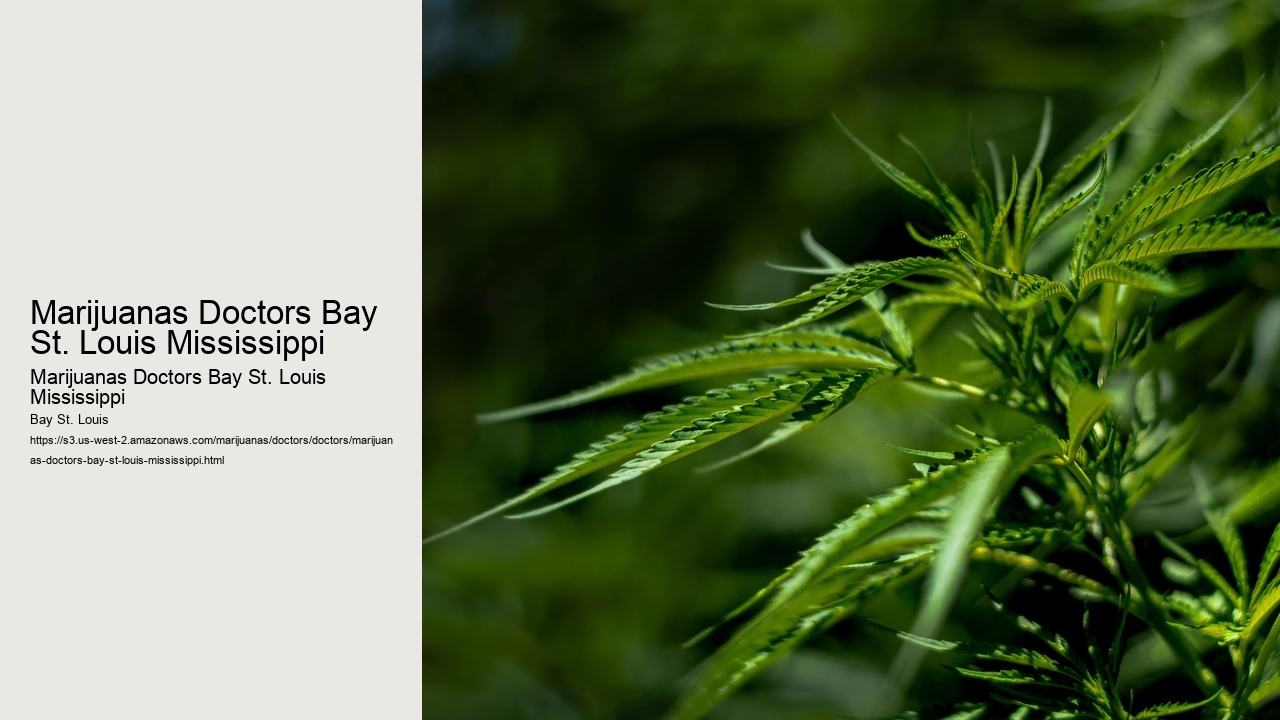
In order to certify that a patient has a qualifying debilitating medical conditions needed for medicinal cannabis treatment in Bay St. Louis MS, doctors, physicians, certified nurse practitioners, physician assistants, or optometrists must be a credentialed and MSDH-approved medical marijuanas doctor.
Mississippi has made legal the use of marijuanas for medical patients in Bay St. Louis Mississippi who meet the 22 main debilitating medical conditions. In February 2022, The Mississippi State Legislature passed the Mississippi Medical Cannabis Act which established the first medicinal marijuanas program in Mississippi.
The new bill reflects key features of Initiative 65, which was approved by more than 74% of Mississippi voters last November, including broad access for patients, decision rights for certifying practioners, a free market, and sustainable revenue models and reasonable regulations.
Patients in Bay St. Louis Mississippi who are looking to become certified medical marijuana patients must:
—
*After you receive your certification from a credentialed and certified medicinal marijuana practioner, then you will apply for your Registry ID Card with the MSDH.
**Registry ID cards will come from the Mississippi Department of Health (MSDH).

The Mississippi Medical Cannabis Act (MMCA) allows patients in Bay St. Louis Mississippi who have one of the 22 qualifying debilitating medical conditions to be certified by an MSDH-credentialed medicinal marijuanas clinic. Qualifying patients will be issued a written certification which, along with the patient’s application for a medical cannabis Registry Identification Card, will be sent to the Mississippi Department of Health (MSDH). After a patient has been certified by a credentialed and MSDH-approved medicinal marijuanas doctor as having a qualifying debilitating medical condition, patients will then need to go to the MSDH Medical Cannabis Program Portal to complete their application. Within 30 days of their application being completed and successfully submitted via the portal, patients will receive an email from the Mississippi Department of Health stating whether or not their application has been approved.
If you are interested in scheduling an appointment with a credentialed & MSDH-approved medical cannabis practitioner, you can click here to find a certified medical marijuana doctor near you in Bay St. Louis MS.

Medicinal marijuanas is the use of marijuanas plants and chemicals to treat certain conditions. It is basically the same thing as recreational marijuanas, but for medicinal use. The cannabis plant has more than 100 cannabinoids, and each one has a different impact on the body.
Delta-9-tetrahydrocannabinol (THC) and cannabidiol (CBD) are the main chemicals used in cannabis medicine found in Bay St. Louis, as THC produces the “high” that people feel when they smoke or consume medical marijuana, meanwhile CBD does not give the user the experience of being “high”.
The reason for this is because the u.s. Drug Enforcement Administration, (DEA), considers cannabis a Schedule I substance. They also consider it likely to be abused. Marcel Bonn Miller (ph.d.), a University of Pennsylvania Perelman School of Medicine substance abuse specialist believes that's why it is necessary to obtain a special license to study cannabis.
That may not change anytime in the near future. While the DEA looked at reclassifying cannabis to an Schedule II drug (such as Ritalin or Oxycodone) it was decided to keep cannabis a Schedule I drug. However, the agency did offer to help further studies on cannabis, and simplify the process for researchers.
"Research is critically needed because we have to be able to advise patients and doctors on the safe and effective use of cannabis," Bonn-Miller states.
Every state has laws dictating the use of medical cannabis, including Bay St. Louis MS. However, more than two-thirds of u.s. states and the District of Columbia have already approved medical marijuana for treatment and are currently looking at bills that would allow the same.
It is extremely important that patients submit their applications with honest and accurate information, that is current and up-to-date. If you accidentally submitted your application with incomplete or inaccurate information, then your application will be rejected, and you will have to re-submit your application. Once you have made the necessary corrections and re-submitted your corrected application, the Mississippi Department of Health, will have another 30 days to approve or deny your corrected application.
No, you will not be given a handwritten marijuanas certification from your practitioner. Your medical cannabis practitioner will go into their MSDH portal and submit your electronic certification there. Please make sure that your name, social security number, and date of birth are accurate! This is how your MSDH application will be matched to your certification.
The medical marijuana practitioner will evaluate your specific eligibility, check any supporting medical paperwork you bring, analyze your medical history, discuss treatment options, answer questions, and more depending on your unique individual needs.
No. The MMCA does NOT require an organization for managed care, health benefit plan, private health insurer, government medical assistance program, employer, property and casualty, or workers’ compensation insurer or self-insured group providing coverage for a medical, pharmacy or health care service to pay for or reimburse any other individual or entity for costs associated with the medical use of marijuana.
In order to certify that a patient has a qualifying debilitating medical condition needed for medical cannabis treatment in Mississippi, physicians, certified nurse practitioners, physician assistants, or optometrists must be credentialed and MSDH-approved medical cannabis practitioners.
Yes. As with any medication, be open with your physicians and your pharmacist about medical marijuana, and any other medications that you may be taking or are considering taking, to ensure that you have all the information you need regarding any potential interactions between your prescriptions.